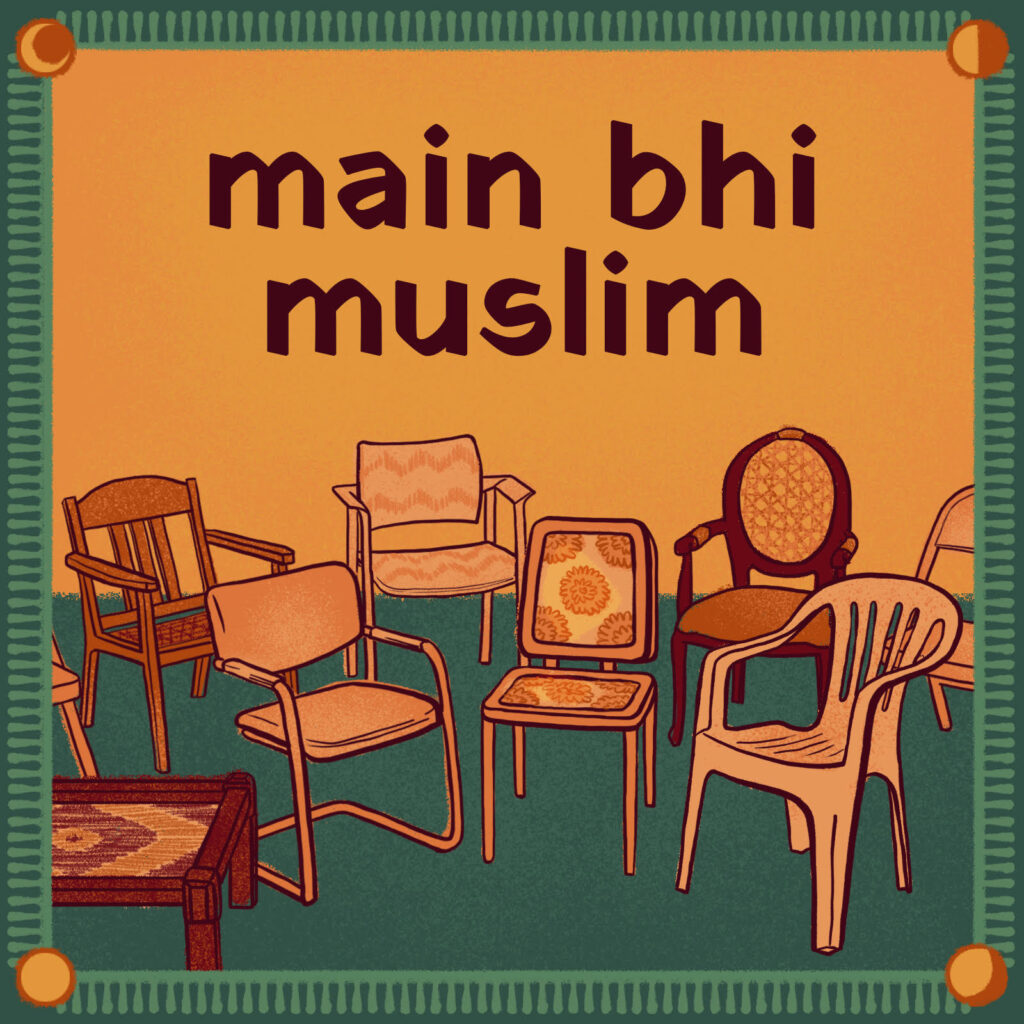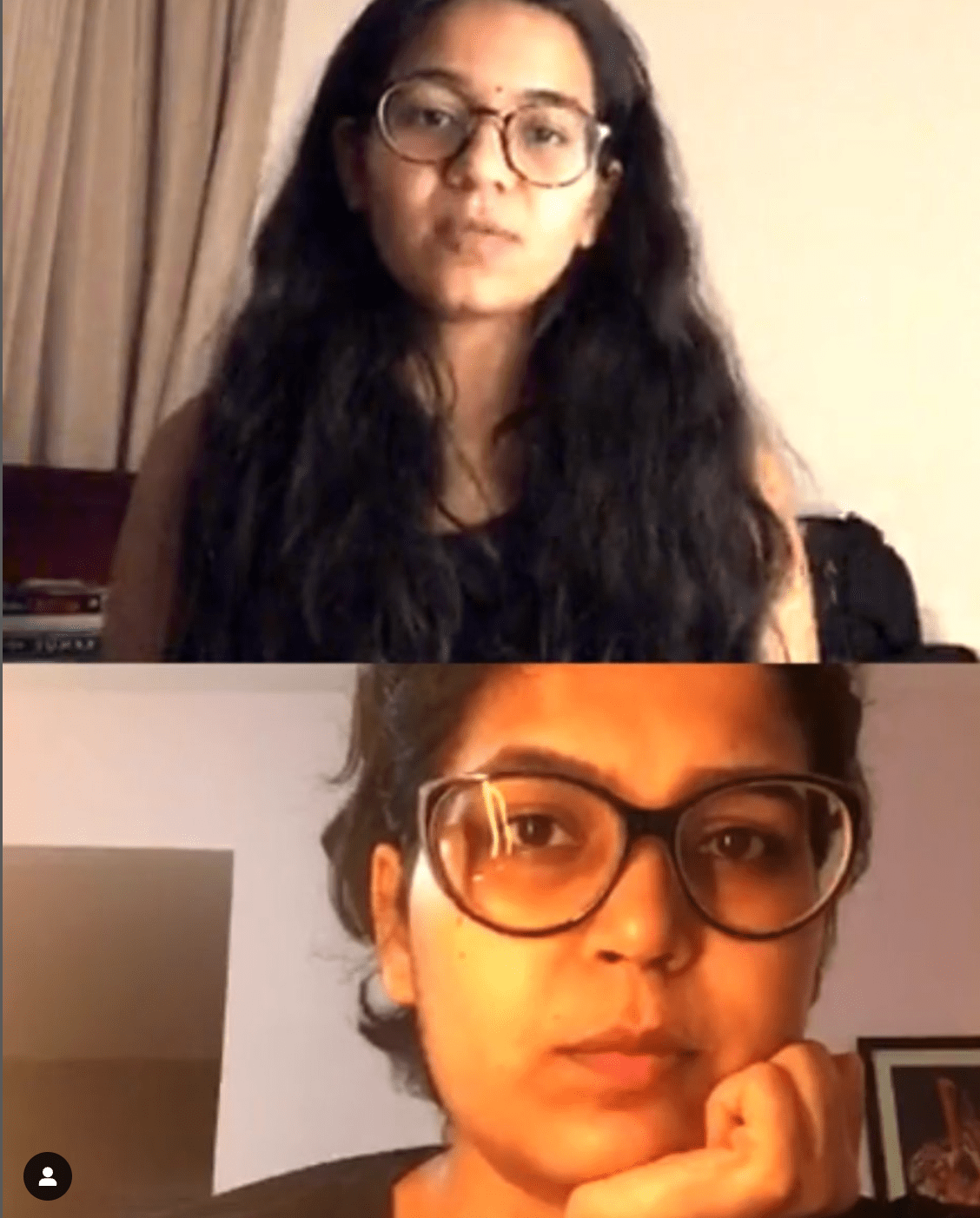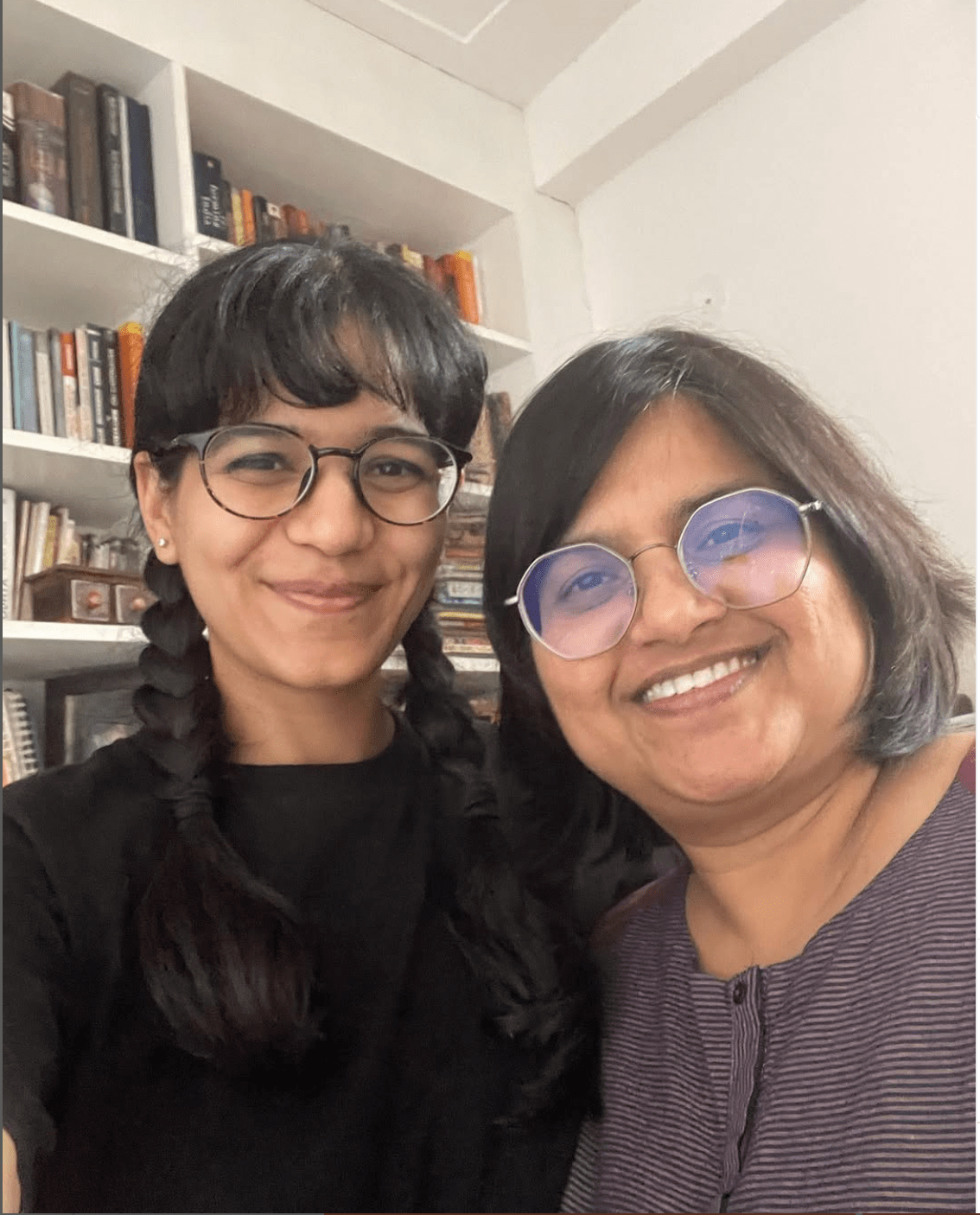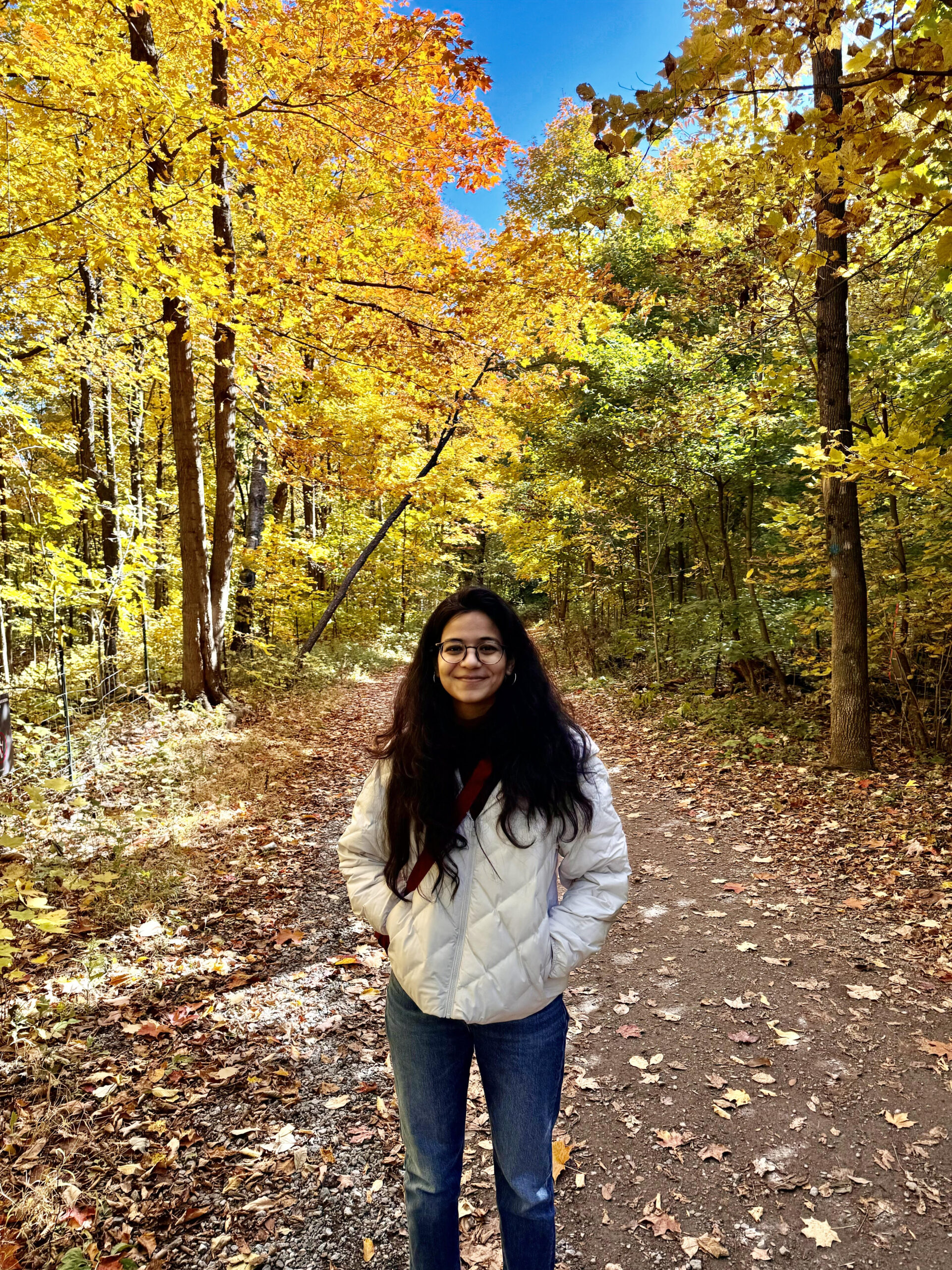

The Main Bhi Muslim podcast started serendipitously. On the early morning of 24 March 2020, just before the first COVID-19 lockdown was announced, a contingent of Delhi police was busy clearing tents, and temporary structures, reportedly using “coercive force”, at a site that had become iconic—Shaheen Bagh.
After about a hundred days of a peaceful and inclusive sit-in protest as part of the anti-CAA-NRC movement, a fast-spreading virus had brought a sudden end. Many worried that the protest that had reignited the idea of democracy would be forgotten. Among them was Mariyam Haider, a Singapore-based researcher-writer focusing on gender, identity, and culture, following the protests online.
Watching hundreds of Muslim women of all ages gather in Shaheen Bagh, despite facing threats of violence by far-right groups and an armed man opening fire near the tents in February 2020, was the moment Haider felt the urge to understand what her Indian Muslim identity meant. “There was always a question around it without any explanation,” she told me. “Someone else was always answering it for me, telling me what it means to be an Indian Muslim and the heavy expectations around it.”
While following the Shaheen Bagh protest on social media, she came across her senior from Delhi University, Sabika Muzaffar, performing poetry at the site. Muzaffar is a journalist, former radio jockey, founder of The Shayari Teller podcast, professional lyricist, and communication designer. She is currently working on a podcast on sustainable building called MudHomies.
While the two knew of each other in college, they hadn’t interacted much. Haider contacted Muzaffar and spoke about their mutual Shia Muslim identity and what it means to be a Muslim woman in India. “I felt seen and heard,” Haider said. “There were similar questions in our minds.”
The more discussions they had, the more they felt this should be a public conversation. So in April 2020, they started a podcast, Main Bhi Muslim (I’m Muslim too). Muzaffar calls it Haider’s brainchild. “She asked if I wanted to be the other mother,” Muzaffar recalled, “and I was more than happy to be.”
A Space To Navigate Identity
Haider didn’t always talk about or examine her Muslim identity. However, growing up in a predominantly Sikh neighborhood in Dehradun, India, and being the only Muslim in her class at school automatically put her in spotlights that she didn’t understand. For instance, the assumptions that she would be the only one to know about Ramzan or an Urdu word made her feel like a “token representation of sorts,” she said.
Haider felt a shift in herself during the Shaheen Bagh sit-in, when she saw thousands of Indian Muslim women represent her identity and Muslimness while reclaiming the idea of equality and freedom. She felt an urge to examine it more intimately and peel the layers. “We have been led to believe that the biggest minority in India is a homogeneous identity, which thinks and reacts a certain way,” Haider reflected. “I wanted to question that through the podcast.”
There are age-old stereotypes about Muslims in India that often stem from an unchanging and unaware lens, and the imposition of ‘otherness’. Specifically, in the last decade or so, the notion of ‘us versus them’ has dominated the tone when talking about Muslims in India. The power imbalance between the majority Hindu religion and minority Muslim identity is now more evident with the imposition of otherness on those who do not conform to mainstream hegemonic norms.
From textbooks to films, an Indian Muslim is shown as wearing either a burqa or skull cap, always covering their head, greeting with an adab, slipping in plenty of Urdu words during a conversation, and women not having any agency.
For Haider, Main Bhi Muslim became a project of self-affirmation. Tired of the media, state, and society defining what being a Muslim was for her, she decided to create a space where people from different regions, perspectives, and gender identities could talk about the everydayness of being an Indian Muslim. “There is little understanding about the Muslim identity,” Haider stated. “For instance, a Muslim from Bihar and Kerala come from very different experiences and can’t be put in the same box.”
Muzaffar also realized that there was an urgency for a space to exist where people could navigate the Indian Muslim identity freely. To date, Haider is Muzaffar’s only Shia Muslim friend. “She is the only one I can talk to about things related to it,” Muzaffar shared. “Sometimes we don’t have people to talk to about parts of our identity so having a space that explores that can make you feel seen.”

The Idea Of A “Good Muslim”
While the podcast was Haider’s idea, its name was Muzaffar’s. It came from a very vulnerable place. Muzaffar has spent almost all her life in India trying to be a “good Muslim.” “The definition of a ‘good Muslim’ in my country is, essentially, being as little Muslim as you can be,” Muzaffar explained. “Over the years, I have realized that no matter what I’ve done to feel safer in this country, my identity can still get me killed. So, Main Bhi Muslim comes from wanting to reclaim my Muslimness in India.”
Haider and Muzaffar started the podcast, which they record online, with glimpses into their own lives and experiences. In Episode 2 titled Aaj Ka Darr Hai, Meri Awaaz, for example, Haider talked about her family’s reluctance to put up a nameplate in front of their house in Dehradun because it meant publicly identifying themselves as Muslim. Meanwhile, in Episode 3 titled Ladne Laayak Laadaii, Muzaffar narrated how she couldn’t rent a place in Mumbai because of her Muslim identity and how her name had been negotiated.
After April 2021, Muzaffar departed from the podcast. Haider shifted Main Bhi Muslim’s focus to guests, who explored different aspects of their Muslim identity such as reclaiming freedom through football (Episode 23), embracing one’s gender-fluidity and transness (Episode 24), and Muslim women negotiating access to public places (Episode 17). Since Muzaffar had experience in radio and podcasting, she wanted to help Haider get started. “Once the foundation was really set with the first season, it felt okay to move on,” Muzaffar said.
Exploring Muslim Feminism
Since then, Haider has explored Indian Muslimness with several thoughtful guests. For example, in Season 2, Episode 5, Haider talked to Khabar Lahariya journalist Nazini Rizvi about reporting in rural regions. Although she likes wearing a bindi, Rizvi said in the podcast that people sometimes question her choice, and the bindi becomes a necessity while reporting places where her Muslim identity could become a problem. “People have told me either remove the bindi or change your name,” she elaborated. “But it is my decision. If I like it, I’ll wear it. What’s their problem?”
For Haider, stereotypes such as bindi and burqa have become a way to identify people and their religion. “So much so that people often stubbornly hold onto their own prejudices about your identity,” she said. “I don’t wear a burqa or cover my head, so people have told me I don’t ‘look’ like a Muslim. I find it jarring. My personal goal is to wipe out the use of stereotypes.”
Haider aims for the podcast to focus on voices and stories that are not always part of the mainstream understanding of Indian Muslim identity. Conversations with Indian Muslim women and gender minorities help deepen the understanding of their unique experiences. “This includes but is not limited to living in a largely patriarchal society with its socio-political realities and dealing with gendered norms and expectations that influence their personal and professional journeys,” she explained.
She has delved into Muslim feminism in India in the podcast through her conversation with author and researcher Dr Ghazala Jamil in Episode 19. In her book, Muslim Women Speak: Of Dreams and Shackles (2017), Jamil spoke to Muslim women from different backgrounds including first-generation learners who expressed their desire to have a good career and be financially independent.
“People rarely talk about Muslim women’s aspirations,” Haider explained. “In India, savarna feminists are dominant in the space and they end up defining feminism for other people, be it for marginalized women or those of a minority religion.”
In the podcast, Jamil talked about how intersectional feminism often doesn’t include Muslim women’s voices. “It is problematic that, for a long time, in mainstream feminist spaces, intersectionality in the inclusion of Muslim women was conditioned upon stripping them of their Muslimness,” Jamil told me. So, a podcast such as Main Bhi Muslim that has created a listening space for different perspectives is much needed, she added.

Talking About Intersectionality
If discussions about Muslim feminism are rare, It’s even rarer to come across any on the intersectional aspects of queer Muslim identity. Through conversations with Dr. Aqsa Shaikh, the first Indian transwoman to head a Covid-19 vaccine center (Season 2, Episode 4), and Zoya (Episode 24) who identifies as a trans person, Main Bhi Muslim has also offered space to explore how people from the LGBTQIA+ community navigated their identity both within and outside the Muslim community.
Gender diversity has always been part of every culture, Haider said. “This idea of a ‘good Muslim’ can be a disservice to people, hinder inclusivity, and cage people into thinking a certain way,” she explained. “As Dr Aqsa pointed out in the podcast, there is double marginalization when you are a Muslim and a trans woman.”
Haider also talked about how it’s important to look inward. She wants Muslims themselves to question their perspectives because “there is internalized Islamophobia and casteism within the community.” Living in a society that constantly defines what a ‘good Muslim’ is, means you have shed parts of yourself to fit that mold.
For Haider, looking inward means getting comfortable with an identity you were born with and having the space to question your own prejudices. “It’s important that I get a chance to define my identity,” she said.

An Archive of Indian Muslim Voices
Dr. Jamil hailed Main Bhi Muslim as a “powerful” podcast and appreciated how it has provided a space for diverse voices within the Muslim community. “Indian ‘Muslimness’ is a dynamic social construct,” she said. “At one point it was an intrinsic and even essential part of the idea of India or ‘Indianness’ itself.” Main Bhi Muslim aims to highlight these rarely talked about aspects of Indian Muslimness.
In the present environment of “explicit and forcible exclusion of Muslims from the idea of India as a Hindu nation and the persistent efforts to dub Muslims as ‘separatists’ or ‘outsiders’, spaces for expression and exploration of Indian Muslimness have been shrinking,” Jamil stated. “In a cultural and social sense, a total erasure of Muslimness has not yet been possible and Muslimness in India has become extremely fraught with anxiety and fear.”
According to Jamil, Main Bhi Muslim is an important effort to discuss some of these issues in this climate. It puts out the Muslim perspectives to other compatriots and helps Muslims foster a dialogue within.
Haider’s vision for Main Bhi Muslim is to create an archive of Muslim voices. “I hope that anyone listening to feels like their idea of Indian Muslimness expands every time they listen,” she said.
Meanwhile, Muzaffar, who continues to follow Main Bhi Muslim closely, said she is constantly inspired by Haider and her zeal to keep the podcast going. She also feels guilty that she hasn’t been able to co-host, especially given the current climate. “You start questioning, ‘What am I doing about it?’” she shared. “So, sometimes, I do think about picking up the phone and telling Mariyam, ‘I want to come back.’”
Find the podcast on the Main Bhi Muslim website and all other podcasting platforms. There are new episodes in the pipeline and Haider hopes to record some episodes in person. A potential collaboration on an anthology is also in the works, which will include some of the stories from the podcast.
Main Bhi Muslim: A Podcast Exploring Indian Muslimness Intersectionally

The Main Bhi Muslim podcast started serendipitously. On the early morning of 24 March 2020, just before the first COVID-19 lockdown was announced, a contingent of Delhi police was busy clearing tents, and temporary structures, reportedly using “coercive force”, at a site that had become iconic—Shaheen Bagh.
After about a hundred days of a peaceful and inclusive sit-in protest as part of the anti-CAA-NRC movement, a fast-spreading virus had brought a sudden end. Many worried that the protest that had reignited the idea of democracy would be forgotten. Among them was Mariyam Haider, a Singapore-based researcher-writer focusing on gender, identity, and culture, following the protests online.
Watching hundreds of Muslim women of all ages gather in Shaheen Bagh, despite facing threats of violence by far-right groups and an armed man opening fire near the tents in February 2020, was the moment Haider felt the urge to understand what her Indian Muslim identity meant. “There was always a question around it without any explanation,” she told me. “Someone else was always answering it for me, telling me what it means to be an Indian Muslim and the heavy expectations around it.”
While following the Shaheen Bagh protest on social media, she came across her senior from Delhi University, Sabika Muzaffar, performing poetry at the site. Muzaffar is a journalist, former radio jockey, founder of The Shayari Teller podcast, professional lyricist, and communication designer. She is currently working on a podcast on sustainable building called MudHomies.
While the two knew of each other in college, they hadn’t interacted much. Haider contacted Muzaffar and spoke about their mutual Shia Muslim identity and what it means to be a Muslim woman in India. “I felt seen and heard,” Haider said. “There were similar questions in our minds.”
The more discussions they had, the more they felt this should be a public conversation. So in April 2020, they started a podcast, Main Bhi Muslim (I’m Muslim too). Muzaffar calls it Haider’s brainchild. “She asked if I wanted to be the other mother,” Muzaffar recalled, “and I was more than happy to be.”
A Space To Navigate Identity
Haider didn’t always talk about or examine her Muslim identity. However, growing up in a predominantly Sikh neighborhood in Dehradun, India, and being the only Muslim in her class at school automatically put her in spotlights that she didn’t understand. For instance, the assumptions that she would be the only one to know about Ramzan or an Urdu word made her feel like a “token representation of sorts,” she said.
Haider felt a shift in herself during the Shaheen Bagh sit-in, when she saw thousands of Indian Muslim women represent her identity and Muslimness while reclaiming the idea of equality and freedom. She felt an urge to examine it more intimately and peel the layers. “We have been led to believe that the biggest minority in India is a homogeneous identity, which thinks and reacts a certain way,” Haider reflected. “I wanted to question that through the podcast.”
There are age-old stereotypes about Muslims in India that often stem from an unchanging and unaware lens, and the imposition of ‘otherness’. Specifically, in the last decade or so, the notion of ‘us versus them’ has dominated the tone when talking about Muslims in India. The power imbalance between the majority Hindu religion and minority Muslim identity is now more evident with the imposition of otherness on those who do not conform to mainstream hegemonic norms.
From textbooks to films, an Indian Muslim is shown as wearing either a burqa or skull cap, always covering their head, greeting with an adab, slipping in plenty of Urdu words during a conversation, and women not having any agency.
For Haider, Main Bhi Muslim became a project of self-affirmation. Tired of the media, state, and society defining what being a Muslim was for her, she decided to create a space where people from different regions, perspectives, and gender identities could talk about the everydayness of being an Indian Muslim. “There is little understanding about the Muslim identity,” Haider stated. “For instance, a Muslim from Bihar and Kerala come from very different experiences and can’t be put in the same box.”
Muzaffar also realized that there was an urgency for a space to exist where people could navigate the Indian Muslim identity freely. To date, Haider is Muzaffar’s only Shia Muslim friend. “She is the only one I can talk to about things related to it,” Muzaffar shared. “Sometimes we don’t have people to talk to about parts of our identity so having a space that explores that can make you feel seen.”

The Idea Of A “Good Muslim”
While the podcast was Haider’s idea, its name was Muzaffar’s. It came from a very vulnerable place. Muzaffar has spent almost all her life in India trying to be a “good Muslim.” “The definition of a ‘good Muslim’ in my country is, essentially, being as little Muslim as you can be,” Muzaffar explained. “Over the years, I have realized that no matter what I’ve done to feel safer in this country, my identity can still get me killed. So, Main Bhi Muslim comes from wanting to reclaim my Muslimness in India.”
Haider and Muzaffar started the podcast, which they record online, with glimpses into their own lives and experiences. In Episode 2 titled Aaj Ka Darr Hai, Meri Awaaz, for example, Haider talked about her family’s reluctance to put up a nameplate in front of their house in Dehradun because it meant publicly identifying themselves as Muslim. Meanwhile, in Episode 3 titled Ladne Laayak Laadaii, Muzaffar narrated how she couldn’t rent a place in Mumbai because of her Muslim identity and how her name had been negotiated.
After April 2021, Muzaffar departed from the podcast. Haider shifted Main Bhi Muslim’s focus to guests, who explored different aspects of their Muslim identity such as reclaiming freedom through football (Episode 23), embracing one’s gender-fluidity and transness (Episode 24), and Muslim women negotiating access to public places (Episode 17). Since Muzaffar had experience in radio and podcasting, she wanted to help Haider get started. “Once the foundation was really set with the first season, it felt okay to move on,” Muzaffar said.
Exploring Muslim Feminism
Since then, Haider has explored Indian Muslimness with several thoughtful guests. For example, in Season 2, Episode 5, Haider talked to Khabar Lahariya journalist Nazini Rizvi about reporting in rural regions. Although she likes wearing a bindi, Rizvi said in the podcast that people sometimes question her choice, and the bindi becomes a necessity while reporting places where her Muslim identity could become a problem. “People have told me either remove the bindi or change your name,” she elaborated. “But it is my decision. If I like it, I’ll wear it. What’s their problem?”
For Haider, stereotypes such as bindi and burqa have become a way to identify people and their religion. “So much so that people often stubbornly hold onto their own prejudices about your identity,” she said. “I don’t wear a burqa or cover my head, so people have told me I don’t ‘look’ like a Muslim. I find it jarring. My personal goal is to wipe out the use of stereotypes.”
Haider aims for the podcast to focus on voices and stories that are not always part of the mainstream understanding of Indian Muslim identity. Conversations with Indian Muslim women and gender minorities help deepen the understanding of their unique experiences. “This includes but is not limited to living in a largely patriarchal society with its socio-political realities and dealing with gendered norms and expectations that influence their personal and professional journeys,” she explained.
She has delved into Muslim feminism in India in the podcast through her conversation with author and researcher Dr Ghazala Jamil in Episode 19. In her book, Muslim Women Speak: Of Dreams and Shackles (2017), Jamil spoke to Muslim women from different backgrounds including first-generation learners who expressed their desire to have a good career and be financially independent.
“People rarely talk about Muslim women’s aspirations,” Haider explained. “In India, savarna feminists are dominant in the space and they end up defining feminism for other people, be it for marginalized women or those of a minority religion.”
In the podcast, Jamil talked about how intersectional feminism often doesn’t include Muslim women’s voices. “It is problematic that, for a long time, in mainstream feminist spaces, intersectionality in the inclusion of Muslim women was conditioned upon stripping them of their Muslimness,” Jamil told me. So, a podcast such as Main Bhi Muslim that has created a listening space for different perspectives is much needed, she added.

Talking About Intersectionality
If discussions about Muslim feminism are rare, It’s even rarer to come across any on the intersectional aspects of queer Muslim identity. Through conversations with Dr. Aqsa Shaikh, the first Indian transwoman to head a Covid-19 vaccine center (Season 2, Episode 4), and Zoya (Episode 24) who identifies as a trans person, Main Bhi Muslim has also offered space to explore how people from the LGBTQIA+ community navigated their identity both within and outside the Muslim community.
Gender diversity has always been part of every culture, Haider said. “This idea of a ‘good Muslim’ can be a disservice to people, hinder inclusivity, and cage people into thinking a certain way,” she explained. “As Dr Aqsa pointed out in the podcast, there is double marginalization when you are a Muslim and a trans woman.”
Haider also talked about how it’s important to look inward. She wants Muslims themselves to question their perspectives because “there is internalized Islamophobia and casteism within the community.” Living in a society that constantly defines what a ‘good Muslim’ is, means you have shed parts of yourself to fit that mold.
For Haider, looking inward means getting comfortable with an identity you were born with and having the space to question your own prejudices. “It’s important that I get a chance to define my identity,” she said.

An Archive of Indian Muslim Voices
Dr. Jamil hailed Main Bhi Muslim as a “powerful” podcast and appreciated how it has provided a space for diverse voices within the Muslim community. “Indian ‘Muslimness’ is a dynamic social construct,” she said. “At one point it was an intrinsic and even essential part of the idea of India or ‘Indianness’ itself.” Main Bhi Muslim aims to highlight these rarely talked about aspects of Indian Muslimness.
In the present environment of “explicit and forcible exclusion of Muslims from the idea of India as a Hindu nation and the persistent efforts to dub Muslims as ‘separatists’ or ‘outsiders’, spaces for expression and exploration of Indian Muslimness have been shrinking,” Jamil stated. “In a cultural and social sense, a total erasure of Muslimness has not yet been possible and Muslimness in India has become extremely fraught with anxiety and fear.”
According to Jamil, Main Bhi Muslim is an important effort to discuss some of these issues in this climate. It puts out the Muslim perspectives to other compatriots and helps Muslims foster a dialogue within.
Haider’s vision for Main Bhi Muslim is to create an archive of Muslim voices. “I hope that anyone listening to feels like their idea of Indian Muslimness expands every time they listen,” she said.
Meanwhile, Muzaffar, who continues to follow Main Bhi Muslim closely, said she is constantly inspired by Haider and her zeal to keep the podcast going. She also feels guilty that she hasn’t been able to co-host, especially given the current climate. “You start questioning, ‘What am I doing about it?’” she shared. “So, sometimes, I do think about picking up the phone and telling Mariyam, ‘I want to come back.’”
Find the podcast on the Main Bhi Muslim website and all other podcasting platforms. There are new episodes in the pipeline and Haider hopes to record some episodes in person. A potential collaboration on an anthology is also in the works, which will include some of the stories from the podcast.
SUPPORT US
We like bringing the stories that don’t get told to you. For that, we need your support. However small, we would appreciate it.








